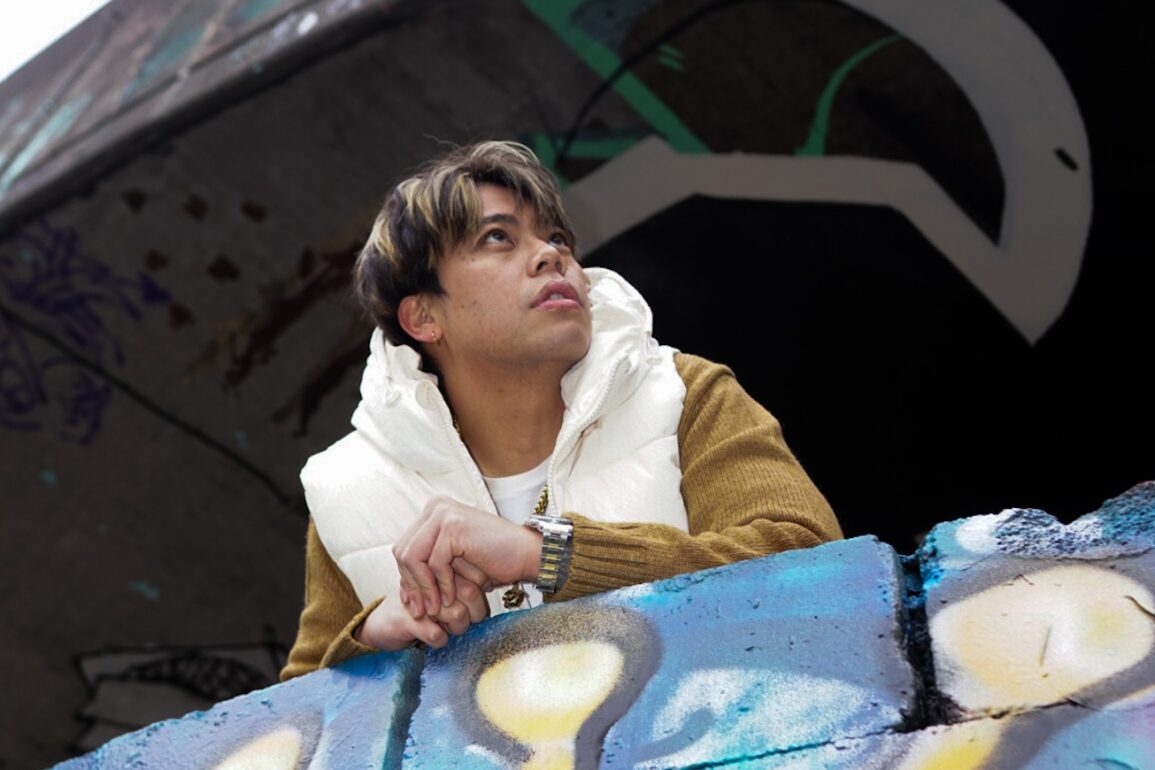Kapa Arkieh is a Vancouver musician with a big dream. A charismatic performer, he’s aiming for a level of success that enables him to change the world for Indigenous kids on the other side of the Pacific Ocean.
“I want to utilize the music—and the funding from music—to start education centres in the villages of Taiwan,” Arkieh tells Pancouver over Zoom. “As I’m on this journey, I realize that music definitely saved my life.”
Hip-hop and R&B have taken Arkieh to some remarkable heights. He toured China from the capital of Beijing to Xiamen in Fujian Province in 2017. He competed on the wildly popular, nationally televised Rap of China TV show. The song that he performed, “那一路啊” vaulted Arkieh onto the Taiwan Viral Top 50 on Spotify. And he’s produced for Dwagie (曾冠榕), a Golden Melody Award winner In Asia.
Most importantly, music has helped connect Arkieh to his Indigenous heritage as Amis, which is the largest tribe in Taiwan.
“We just need a bigger platform for people to know about us,” Arkieh says. “I just want to use the music as that platform to be able to share the culture. And hopefully, the culture will live on through the music and through the art.”
Arkieh was able to experience the joy of performing before Indigenous people in Taiwan in April at the Jade Music Fest in Asia. He brought his high-energy stage show to Huashan 1914 Creative Park, which is one of Taipei’s primary arts centres.
“I’ve never had the crowd sing the Indigenous songs with me,” Arkieh says.
In November, he’ll perform at the Jade Music Fest, which aims to make Vancouver a hub for Chinese-language music in North America.
[embedded content]
Watch Kapa Arkieh perform “Crypto Making Me Millions”.
Arkieh came to Canada as a child
He met some amazing musical artists in Asia, including Singaporean icon Ling Seow/Xiao, and performed at a couple of festivals. But live music went into hibernation in the pandemic, so Arkieh turned his attention to film projects. He was part of the cast of Trailblazn, a 2021 film celebrating Asians in hip-hop. Vancouver rapper Scope, a.k.a. Gerry Sung, served as executive producer.
In B.C., Arkieh also performed in the music video and wrote lyrics for “Crypto Making Me Millions”, which was created for the documentary Dead Man’s Switch; A Crypto Mystery. The film about former Vancouver cryptocurrency entrepreneur Gerald Cotten won 2022 Leo Awards for Best Musical Score for a documentary feature and Best Feature Length Documentary.
Much of this would have been inconceivable to Arkieh in his youth in North Burnaby.
Arkieh was born in Taiwan where he started playing the piano at the age of three. This came at the behest of his mother, who loved music and earned her living as a nurse. His continued after his family immigrated to B.C. three years later. When he performed in church, Arkieh realized how much people liked listening to his piano music.
“I realized how good I was becoming and at some point, when I was a kid, I wanted to be a classical pianist until I was a little bit older,” Arkieh recalls. “Then, I got influenced by popular music.”
He says that his parents endured bullying in school because of their Indigenous ancestry. He believes that’s why they didn’t emphasize Amis culture to their kids.
Moreover, Arkieh feared self-identifying as Indigenous in the 1990s because he worried that this came with negative connotations. So, he told most people that he was Chinese. However, he revealed to close friends that he was Taiwanese.
[embedded content]
Indigenous performers in the family
As Arkieh grew older, he started meeting Indigenous artists, including DJ Dungii Sapor, who is also Amis. She’s a law school grad in Taiwan who integrates modern, danceable beats with traditional Amis music.
“They were embracing the culture and I was just thinking why am I not doing the same?” Arkieh asks.
He became more curious about his ancestry. Much to his surprise, there were Indigenous performers on his mom’s side of the family.
“They toured around Asia doing Indigenous dance and Indigenous songs,” he reveals.
One of Arkieh’s uncles released albums in the 1980s and appeared on TV in Taiwan.
“I was, like, ‘Wow! I never knew about all of this stuff.’ ”

His family roots go back to Hualien County on the northeast coast of Taiwan.
“Back in my parents’ days, a lot of the Amis people were fishermen,” Arkieh says.
Indigenous villages in this part of Taiwan are separated from the big cities by mountains, so they’re quite isolated. According to Arkieh, Amis people are known for their athleticism. A lot of them play baseball, whereas others are singers, songwriters, and rappers.
Arkieh believes that the propensity for singing may be related to the Amis tradition of communicating across wide distances in the mountains. He says that Amis people do this with their voices in what he describes as almost a combination of yelling and yodeling.
‘I imagine it’s been the foundation for us to continue doing the singing and art.”
[embedded content]
Heritage informs the music
He speaks fluent Mandarin and he hopes to improve his Taiwanese Hokkien, which his mother speaks fluently. His dad speaks some Japanese, which is a holdover from the Japanese colonization of Taiwan from 1895 to 1945.
Arkieh recognizes that the word “Chinese” has many different meanings. It can refer to residents of the People’s Republic of China or all the cultures that go along with that. Furthermore, he points out that the term “Chinese” is applied to classical instruments that come from China, such as the guzheng.
“The Chinese language—the characters and things like that—is all part of China,” Arkieh adds.
Yet, the Amis people are an Austronesian ethic group who speak the Amis language. The Austronesian people made their way from Taiwan to the Philippines more than 4,000 years ago before dispersing throughout the Indo-Pacific as far as New Zealand and Madagascar. So, the Amis people are actually related to Indigenous people who don’t have any links whatsoever to China.
“It’s kind of funny,” Arkieh comments. “When I’m in Vancouver, a lot of people think I’m Filipino.”
This complicated heritage informs his music. He likes combining Asian Indigenous beats along with freewheeling hip-hop vocals and lively guitar work.
“I would say I try to bring everything in from my life and incorporate all the cultures that I am a part of into the music,” Arkieh says. “I try to incorporate everything from what my parents listen to all the way to what I listen to—and then amalgamate everything.”
[embedded content]
Kapa Arkieh speaks to Pancouver editor Charlie Smith.
Event details
Kapa Arkieh will perform at the Jade Music Fest, which will be held in Vancouver from November 6 to 9. For more information, visit the Jade Music Fest website. To learn more about Kapa Arkieh, visit his website or follow him on Instagram. Follow Pancouver on Twitter @PancouverMedia and on Instagram @PancouverMedia.
This article is part of “Beyond Chinese”, a joint initiative of Pancouver and the Asian-Canadian Special Events Association. Through interviews with artists and cultural workers, Beyond Chinese offers a nuanced view of people with East Asian ancestry.
This post was originally published on this site be sure to check out more of their content.







